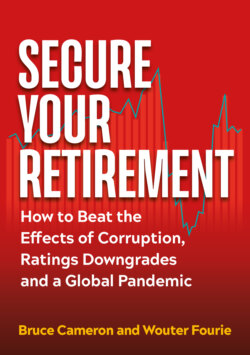Читать книгу Secure Your Retirement - Брюс Кэмерон - Страница 11
На сайте Литреса книга снята с продажи.
Longevity
ОглавлениеLongevity is another factor that is becoming increasingly important for retirees to keep in mind. The information below shows how crucial this issue is when planning your financial future:
People will be living for longer and longer. The average date of death at age 60 is 79 for males and 84 for females. And the longer you live, the more money you require. Many more people are living into their 90s and will need more money than those who die before the average age.
Longevity problems are then compounded by the following factors:
The age at which you retire has an impact on your finances. Early retirement means the loss of both income and further savings, and the loss, if you are employed, of other service benefits. Of the number of people surveyed by Alexander Forbes, about 50 percent of members retired on their normal retirement date, 36.5 percent retired early and 14.95 percent retired late. In 2019, the average age of retirement was 63.
The contributions you have made towards retiring are critical. A separate Alexander Forbes survey, Member Watch, in which more than one million contributing members are measured, shows that higher contributions and length of service are critical to securing a reasonable retirement income.
To receive a replacement ratio of 70 percent, you need to contribute from both yourself and your employer the following amounts at retirement, age 65: if you start at age 20, you need a contribution rate of 13 percent; or if you are age 25, you need a contribution rate of 17 percent. These are contributions from both you and your employer.
If you aim to retire at age 60, you will not achieve a replacement ratio of 70 percent under the above scenarios.
Anderson says that if you retire at age 65 rather than at age 55, you will almost double your replacement ratio, assuming you started to save at age 25. Given current market conditions following the COVID-19 outbreak and Moody’s downgrade, delaying your retirement and staying employed for longer on a full- or part-time basis, if possible, may be a good approach.
Inflation for retirees typically rises above the average inflation rate. The reason for this is medical aid, where the rate of inflation is higher than average inflation. You will spend an estimated 60 percent of your money on medical claims after you turn 60. The result of earning too little as a pension means that many pensioners are dropping out of medical schemes or downgrading to a lower option at the very time they need medical aid most. And the longer you live, the greater the impact will be.
